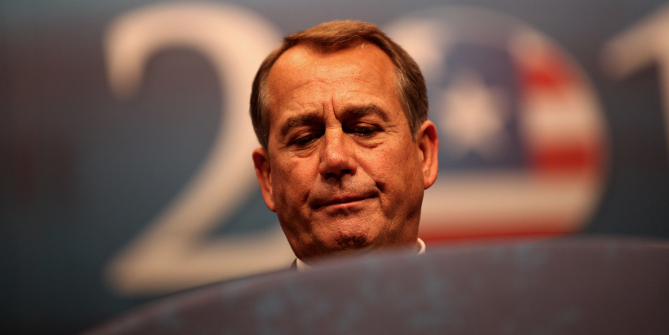USApp Managing Editor, Chris Gilson looks at the best in political blogging from the Beltway. Our round-up of state blogs will follow on Saturday afternoon.
The Democratic Party, the GOP and elections
This week saw President Obama under fire from Republicans as House Speaker John Boehner continued in his plan to bring a lawsuit against the President. On Sunday, PoliticusUSA says that Boehner is pursuing the lawsuit as a way to silence calls from the GOP for impeachment. They say that comments from the Chairman of the House Judiciary Committee, Bob Goodlatte (R-VA) that Obama has not committed the kind of criminal acts that would call for impeachment may have hurt the case being made by some in his party. Later in the week, Hit & Run writes that Boehner’s lawsuit is unlikely to succeed in court, but that it doesn’t have to – it will give the GOP the opportunity to point out a specific instance where the President has failed to fully execute the law, in a formal setting. Meanwhile, Daily Kos reports that while visiting Texas last week, Obama said that he was ‘the guy doing his job’ (referring to his recent executive actions), whereas Congress is ‘the other guy’.

Despite his tough words towards the GOP in Congress, Democrats are keen for the President to keep away from them as they campaign ahead of this year’s midterm elections, writes United Liberty. They say that vulnerable Senate Democrats are avoiding the President, so to deny Republicans effective visuals for campaign ads. National Journal also has this year’s midterm elections in mind, writing on Sunday that Democrats should by no means be counting on the recent strong jobs report to boost their chances. They say that voters are unlikely to feel better about the economy by November, and that the economy is less important during off-year races. On Thursday, Hit & Run writes that Obamacare is also a ‘drag’ on Democrats, with candidates in states like Michigan and Colorado hurting because of the feeling in those states that passing the health law was a bad idea.
Looking ahead to the 2016 presidential election, Crooks and Liars writes on Monday that the current Democratic Governor of Maryland, Martin O’Malley’srecent trip to Iowa has all the trappings of a presidential campaign – but without the announcement of his candidacy. The Atlantic looks at another potential Democratic candidate for 2016, Senator Elizabeth Warren of Massachusetts. They write on Tuesday that Warren is campaigning in red states, in order to prove her solidarity with candidates that need the most help, and that her populist message extends beyond her own deep-blue home state.

Moving over the Republican Party, on Saturday, PoliticusUSA reports that a small, but vocal, minority from the GOP’s business and moderate wings are calling for Mitt Romney to again run for the presidency in 2016. They say that Romney is far too moderate for the Tea Party base, and that the Republican establishment are likely to think twice before giving a ‘two-time loser’ a second chance. On Monday, The Daily Signal looks at two Republicans who may be more likely contenders for the GOP’s presidential nomination – Senator Rand Paul (KY) and Texas Governor Rick Perry. They write that Paul has ‘blasted’ Perry for his mischaracterized version of Paul’s foreign policy, where Perry labeled him an isolationist. Outside the Beltway wonders if the GOP could nominate a candidate who supports same-sex marriage for the 2016 presidential election. They say that while the idea seems like sheer fantasy today, if the Supreme Court were to decide that same-sex marriages were legal, it would end debate on the matter, as the Republican Party would be seen to be behind the times if they tried to stop it.
This week saw a variety of opinions on who might control the Senate after the fall’s midterm elections. Roll Call’s Rothenblog writes that control of the chamber is still up in the air, as while three Democratic seats look to be headed to the GOP, gaining the further three that are needed (especially Virginia) may not be as easy as some believe. Sabato’s Crystal Ball echoes this, writing that the GOP will have to beat two Democratic incumbents in the fall to win the Senate – something that they have not done since 1980. The Monkey Cage gives an update of their midterm election forecast on Tuesday, writing that the GOP has an 86 percent chance of winning a Senate majority.
Hit & Run reports that a new survey of Millenials shows that they do not have confidence in neither the GOP nor the Democratic Party. They say that half do not trust either to handle issues like privacy, and over 40 percent feel the same about both party’s handling of the budget deficit and drugs policy.
Government, the Beltway and Congress’ agenda
The Republican Party’s investigation into the 2012 attacks in Benghazi is ongoing. This week saw the Attorney General, Eric Holder, state that the criticism being leveled at the Obama Administration to try one of the suspects in a civilian court is ‘purely political’, reports The Daily Signal.
On Saturday, the White House Dossier argues that the investigation into the alleged targeting of conservative organizations by the Internal Revenue Service now requires a Special Prosecutor. They say that the ‘whiff of crime’ is so undeniable that either the Justice Department must name a Special Prosecutor, or the House must appoint a select committee to investigate, or both.
This week United Liberty gives another reason for the Export-Import Bank to be wound up – that it spent $580 million last year to finance Russian owned companies. The bank, which gives guaranteed loans to importers and exporters, is facing a great deal of scrutiny by Republicans ahead of the vote to reauthorize it in September.
Outside the Beltway writes on Saturday that the ongoing border crisis has devolved into a partisan battle between Congress and the White House, and that there have been few concrete proposals on how to address the crisis from Congressional Republicans. They say that while Obama can tinker around the edges – changing how deportation proceedings are prioritized or sending more border control agents – it is another issue that will not be solved, unless Congress acts by passing the President’s supplemental spending package, amending the 2008 law which prevents the deportation of minors to Central America, or ideally, by passing comprehensive immigration reform.
On Monday, PoliticusUSA reports that the Senate Majority Leader, Harry Reid (D-NV), has scheduled a vote this week on the Protect Women’s Health from Corporate Interference Act, which would restore the contraceptive coverage that was recently removed under the Supreme Court’s Hobby Lobby decision. They say that the Democrats will not likely have the five GOP votes needed to break a Republican filibuster, but it is important that they try.
Congress was able to make progress this week- with the House passing a bipartisan amendment which would prevent the Treasury Department from spending any funding to penalize financial institutions that provide services to marijuana business that are legal under state law, writes Hit & Run.
Foreign policy, defense and trade
On Monday, Roll Call’s Five by Five looks at whether the U.S. can (or should) train more countries to handle their own threats. They write that with attitudes and budgets moving against foreign interventions, it might be better option to train countries, such as Columbia, to deal with their own insurgencies.
Much of the commentary on the crisis at the U.S. border has focused on the lack of adequate border enforcement. The Daily Signal takes a different tack, writing that Mexico’s strategy for security at its border with Guatemala is inadequate, as there are hundreds of unofficial entry points. They say that a cargo train, known as ‘La Bestia’, is also a source of unlawful immigrants, as it travels from southern Mexico to cities on the U.S.-Mexico border.
In the latest development over the U.S-Germany spying scandal, Hit & Run reports that a German committee that was allegedly being spied upon is considering moving to mechanical typewriters in order to keep its secrets safe.
On Tuesday, Roll Call says that the troubled F-35 Joint Strike Fighter program, which was grounded last week after an aircraft fire, is too big to fail, with an estimated price tag of $1 trillion over the next 55 years. They write that the F-35 was supposed to debut at the Farnborough Air Show in the UK this week, but that Pentagon officials decided against it.
This week, The Feed calls for a ‘shake up’ in President Obama’s foreign policy, as President George W. Bush did in his second term. They say that bringing in more experts into the small group of people that make key foreign policy decisions would send a powerful signal overseas.
Obamacare and health policy

This week saw the President’s signature healthcare reform, the Affordable Care Act (or Obamacare) take renewed criticism. On Monday, National Review’s The Campaign Spot writes that the public’s disapproval for the reform is proving difficult to overcome, with approval staying in the mid-40 percent range in recent polls. One reason for the public’s disapproval may be the difficulty people are having in using Obamacare to purchase insurance. Wonkblog writes that a new survey shows that around 10.6 million people had personal assistance to sign up during the Obamacare’s first enrollment period, with most assistance programs spending more than an hour to help people.
On Thursday, Hit & Run writes that despite what the Obama Administration has promised, the back end of the Obamacare federal exchange is still not finished, and may not be ready until next year. They say with the back-end financial systems not working, insurers are relying on ‘quasi-manual’ workarounds, and the exchange is also having difficult verifying income and citizenship data for applicants. Outside the Beltway writes on the latest legal challenge to the healthcare law – one that is challenging the federal government’s offering of tax credits to those who buy insurance on Obamacare exchanges in states without exchanges. They say if the case is successful, it would ‘effectively gut’ Obamacare.
The economy and society
On Tuesday, RedState gives what they say are eight myths surrounding the debate over immigration and illegal immigration from Mexico into the U.S. These include that Ronald Reagan’s 1986 ‘one-time’ amnesty was a permanent solution, that they are ‘undocumented’, rather than ‘illegal’ immigrants, and the border will never be 100 percent secure. Staying on the immigration topic, Wonkblog writes on Thursday that Americans are abandoning their support for a path to citizenship for undocumented immigrants. They say that 60 percent of Republicans and 56 percent of Independents (and 46 percent of Democrats) want the deportation process for undocumented workers sped up, and that the older Americans get, the more likely they are to be in favor of a speedier process.
And finally…
Informed Comment reports on Sunday that draft notices have been send out to 14,000 men in Pennsylvania who were born in the 1800s, after the US Selective Service database merge used two digit years.
Wonkblog maps where America’s bowling alleys are, saying that the number of bowling alleys has been declining for 30 years. They say that the country’s bowling centers are clustered around the Great Lakes and in the upper Midwest.
Finally, feeling stressed? That might be because you’re paying attention to politics, writes Outside the Beltway.
Featured image credit: Cody Geary, Flickr CC-BY-NC-ND-2.0
Please read our comments policy before commenting.
Note: This article gives the views of the author, and not the position of USApp– American Politics and Policy, nor of the London School of Economics.
Shortened URL for this post: http://bit.ly/1zR3Oph






